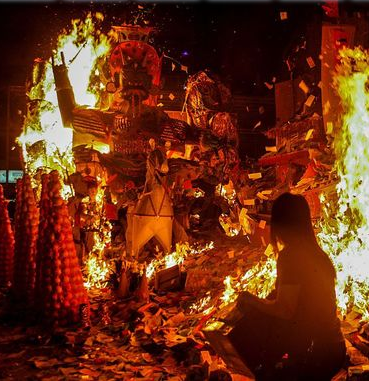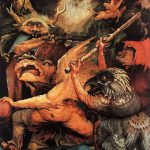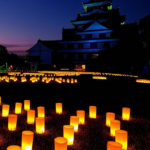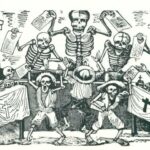
The Hungry Ghost Festival ( also known as The Yulan Assembly or Zhongyuan Jie) is a traditional Chinese festival and holiday, which is celebrated by Chinese in many countries.
The fifteenth day of the seventh month in the lunar calendar is called Ghost Day and the seventh month in general is regarded as the Ghost Month (鬼月). It falls at the same time as a full moon, the new season, the fall harvest, the peak of Buddhist monastic asceticism, the rebirth of ancestors, and the assembly of the local community.
Ghosts and spirits, including those of deceased ancestors, come out from the lower realm of Heaven and Hell and both Taoists and Buddhists perform rituals to transmute and absolve their sufferings. Intrinsic to the Ghost Month is veneration of the dead, where traditionally the filial piety of descendants extends to their ancestors even after their deaths.
Here are the dates for The Hungry Ghost Festival from 2018 to 2021
| 2018 | August 25th |
| 2019 | August 15th |
| 2020 | September 2nd |
| 2021 | August 22nd |
The Chinese fear the dead and the dragons of the air. They also devote the first three weeks in April to visiting the graves of their ancestors, and laying baskets of offerings on them. The great dragon, Feng-Shin, flies scattering blessings upon the houses. His path is straight, unless he meets with some building. Then he turns aside, and the owner of the too lofty edifice misses the blessing.
Origin
The origin story of the modern Ghost Festival, ultimately originated from ancient India, deriving from the Mahayana scripture known as the Yulanpen or Ullambana Sutra. The sutra records the time when Maudgalyayana achieves abhijñā and uses his newfound powers to search for his deceased parents. Maudgalyayana discovers that his deceased mother was reborn into the preta or hungry ghost realm. She was in a wasted condition and Maudgalyayana tried to help her by giving her a bowl of rice. Unfortunately as a preta, she was unable to eat the rice as it was transformed into burning coal. Maudgalyayana then asks the Buddha to help him; whereupon Buddha explains how one is able to assist one’s current parents and deceased parents in this life and in one’s past seven lives by willingly offering food, etc., to the sangha or monastic community during Pravarana (the end of the monsoon season or vassa), which usually occurs on the 15th day of the seventh month whereby the monastic community transfers the merits to the deceased parents.
Customs
During this month, the gates of hell are opened up and ghosts are free to roam the earth where they seek food and entertainment. These ghosts are believed to be ancestors of those who forgot to pay tribute to them after they died, or those who were never given a proper ritual send-off. They have long needle-thin necks because they have not been fed by their family, or as a punishment so that they are unable to swallow.
Family members offer prayers to their deceased relatives, offer food and drink and burn hell bank notes and other forms of joss paper (papier-mâché form of material items such as clothes). Joss paper items are believed to have value in the afterlife, considered to be very similar in some aspects to the material world.
People burn paper houses, cars, servants and televisions to please the ghosts. Families also pay tribute to other unknown wandering ghosts so that these homeless souls do not intrude on their lives and bring misfortune. A large feast is held for the ghosts on the fourteenth day of the seventh month, when people bring samples of food and place them on an offering table to please the ghosts and ward off bad luck.
In some East Asian countries today, live performances are held and everyone is invited to attend. The first row of seats are always empty as this is where the ghosts sit. The shows are always put on at night and at high volumes as the sound is believed to attract and please the ghosts. Some shows include Chinese opera, dramas, and in some areas, even burlesque shows. Traditionally Chinese opera was the main source of entertainment but the newer shows, concerts, dramas, wars and so forth are referred to as Getai.
For rituals, Buddhists and Taoists hold ceremonies to relieve ghosts from suffering, many of them holding ceremonies in the afternoon or at night (as it is believed that the ghosts are released from hell when the sun sets). Altars are built for the deceased and priests and monks alike perform rituals for the benefit of ghosts. Monks and priests often throw rice or other small foods into the air in all directions to distribute them to the ghosts.
During the evening, incense is burnt in front of the doors of households. Incense stands for prosperity in Chinese culture, so families believe that there is more prosperity in burning more incense. During the festival, some shops are closed as they want to leave the streets open for the ghosts. In the middle of each street stands an altar of incense with fresh fruit and sacrifices displayed on it.
Fourteen days after the festival, to make sure all the hungry ghosts find their way back to hell, people float water lanterns and set them outside their houses. These lanterns are made by setting a lotus flower-shaped lantern on a paper boat. The lanterns are used to direct the ghosts back to the underworld, and when they go out, it symbolizes that they have found their way back.
Some of the most vivid celebrations of the Hungry Ghost Festival take place in Jiangxi Province and Hunan Province, as well as in Hong Kong.
In South-East Asian countries like Indonesia, Singapore, and Malaysia, they do a concert called Getai. They give the ghosts singing, dancing, opera, and or a puppet show as entertainments. During Getai, the front row seats for the audience must be empty for the ghosts to sit.
In Taiwan, during Ghost Month, people avoid to do something risky like surgery, buying cars, swimming, moving to another house, marrying, whistling, or taking pictures after dark. They also burn the incense and hell money, offering the spirits food, and releasing water lanterns.
Tết Trung Nguyên in Vietnam
This festival is originally known as Tết Trung Nguyên and is viewed as a time for the pardoning of condemned souls who are released from hell. The “homeless” should be “fed” and appeased with offerings of food. Merits for the living are also earned by the release of birds and fish. The lunar month in which the festival takes place is colloquially known as Tháng Cô Hồn – the month of lonely spirits, and believed to be haunted and particularly unlucky.
Influenced by Buddhism, this holiday coincides with Vu Lan, the Vietnamese transliteration for Ullambana.
In modern times, Vu Lan is also seen as Parents’ Day. People with living parents would bear a red rose and would give thanks while those without can choose to bear a white rose; and attend services to pray for the deceased.
Pchum Ben in Cambodia
In Cambodia, a fifteen-day-long annual festival known as Pchum Ben occurs generally in September or October. Cambodians pay their respects to deceased relatives up to seven generations. The gates of hell are believed to open during this period and many people make offerings to these hungry ghosts.
Boun khao padap in Laos
In Laos, a festival known as, Boun khao padap din usually occurs in September each year and goes on for two weeks. During this period, it is believed that hungry ghosts are freed from hell and enter the world of the living. A second festival known as Boun khao salak occurs directly after the conclusion of Boun khay padab din. During this period, food offerings are made to the hungry ghosts.
Matakadānaya in Sri Lanka
In Sri Lanka, food offerings are made to the hungry ghosts on the seventh day, three months and one year after the death day of a deceased person. It is a ceremony conducted after death as part of traditional Sri Lankan Buddhist funeral rites and is known as mataka dānēs or matakadānaya. The offerings that are made acquire merit which are then transformed back into the equivalent goods in the world of the hungry ghosts.
The offering that is offered on the seventh day, comes a day after personalized food offerings are given in the garden to the spirit of the deceased relative, which occurs on the sixth day. The deceased who do not reach the proper afterworld, the Hungry Ghost realm, are feared by the living as they are believed to cause various sicknesses and disasters to the living.
Buddhist monks are called upon to perform Paritta (the Buddhist practice of reciting certain verses and scriptures in order to ward off misfortune or danger, as well as to the specific verses and discourses recited as paritta texts) to ward off the floating spirits. The rite is also practiced in Thailand and Myanmar and is also practiced during the Ghost Festival that is observed in other Asian countries.
Sat Thai in Thailand
In Thailand, a fifteen-day-long annual festival known as Sat Thai is celebrated between September and October in Thailand especially in southern Thailand, particularly in the province of Nakhon Si Thammarat.
Like related festivals and traditions in other parts of Asia, the deceased are believed to come back to earth for fifteen days and people make offerings to them. The festival is known as Sat Thai to differentiate it from the Chinese Ghost Festival which is known as Sat Chin in the Thai language.
Chit Gwee Pua in Indonesia
In Indonesia, during the festival popularly known as Chit Gwee Pua (Chinese: 七月半), Chit Nyiat Pan in Hakka, Cioko, or Sembahyang Rebutan in Indonesian (Scrambling prayer), people gather around temples and bring an offering to a spirit who died in an unlucky way, and after that, they distribute it to the poor. The way people scramble the offerings is the origin of the festival name mostly known in Java Island.
On other islands like North Sumatra and Riau, a live concert known as Getai and tomb sweeping known as Sembahyang Kubur are common practices to pay respect to the ancestor spirit. Looking for some luck, they will bought hell notes called Kim Cua (Chinese: 金纸) and paper-based goods like paper house, paper horse, paper car. Those goods will end up burned as it is believed that goods will sent to help the spirit feel better in afterlife.
In Bali and some parts of Indonesia, particularly among the indigenous Hindus of Indonesia, ancestors who have died and cremated are said to return to visit their former homes. This day is known as Hari Raya Galungan and celebrations typically last over two weeks, often in the form of specific food and religious offerings along with festivities. The festival date is often calculated according to the Balinese pawukon calendar and typically occurs every 210 days.







